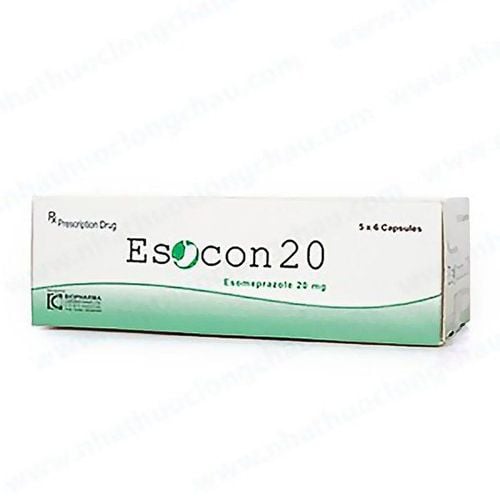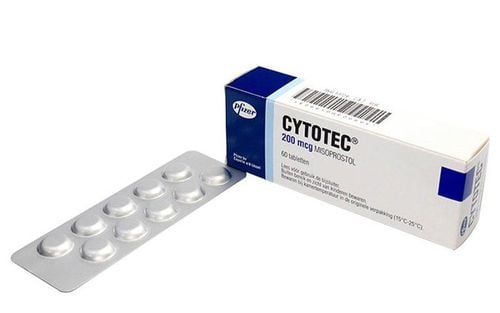This is an automatically translated article.
Remitab drug is commonly used in the treatment of gastric ulcers and gastric mucosal lesions with the main ingredient being Rebamipide. Let's learn more about the uses and uses of Remitab through the article below.
1. What is Remitab?
What is Remitab? Remitab belongs to the group of gastrointestinal drugs with the main ingredient being the active ingredient Rebamipide 100mg and other excipients such as: Lactose, Sodium starch glycolate, Corn starch, Aerosil, Polyvinyl pyrolidon (PVP) K30, Magnesium stearate, Hydroxypropylmethyl cellulose 606, Hydroxypropylmethyl cellulose 615, Titanium dioxide, Talc, PEG 6000.
Remitab is prepared in the form of film-coated tablets packed in boxes of 3 blisters, 5 blisters and 10 blisters x 10 tablets, belonging to the product of US Pharma Joint Stock Company. USA - VIETNAM.
2. What are the effects of Remitab?
Remitab is used in the following cases:
Stomach ulcers. Treatment of gastric mucosal lesions such as gastric erosion, gastric bleeding, redness and edema in acute gastritis and exacerbation of chronic gastritis.
3. Dosage - How to take Remitab
How to use: Remitab is for oral administration and can be taken with or without meals.
Dosage:
Treatment of stomach ulcers: The usual dose of Rebamipide for adults is 100mg, taken 3 times a day by mouth in the evening and at bedtime. Treatment of gastric mucosal lesions such as gastric erosion, gastric bleeding, redness and edema: Acute gastritis and acute exacerbation of chronic gastritis: The usual dose of Rebamipide for adults is 100mg, 3 times/day orally. Adults: 1 tablet of Rebamipide x 3 times a day Note: The above is just a reference dose for patients. Patients should carefully read the instructions on the drug use sheet or strictly follow the instructions of the doctor or pharmacist.
4. Contraindications to taking Remitab
Remitab should not be used in the following cases:
Patients with hypersensitivity to Rebamipide or to any of its ingredients. Children Pregnant women Nursing mothers Elderly people
5. Side effects occur when taking Remitab
During the use of Remitab, if the patient encounters some unwanted effects such as jaundice, liver dysfunction, leukopenia, thrombocytopenia, the patient should immediately go to the nearest medical facility for treatment. treatment, avoid long-term adverse effects on health.
In addition, some other side effects have been reported such as:
Hypersensitivity: Rash, urticaria, pruritus, eczema-like drug rash, other hypersensitivity symptoms. Neuro-psychiatric: Drowsiness, numbness, dizziness, taste disturbance. Stomach - intestines: Constipation, diarrhea, feeling of bloating, nausea, vomiting, dry mouth, heartburn, abdominal pain, belching, taste abnormalities, bloating,... Liver dysfunction: Increased levels of ALT (GPT), AST (GOT), , y – GTP, alkaline phosphatase. Hematology: Leukopenia, thrombocytopenia, agranulocytosis,... Menstrual disorders Increased blood urea nitrogen (BUN), Facial edema. Feeling of a foreign object in the throat. Swollen and painful breasts Induction of lactation due to gynecomastia in men. Palpitations, fever, cough, flushing, tongue numbness, acute respiratory distress, hair and hair loss, thirst, erythema pruritus.
6. Notes when using Remitab
During the use of Remitab, patients should note:
Caution with Lactose excipients: Patients with rare hereditary disorders of galactose tolerance, Lapp lactase deficiency or glucose absorption disorders - galactose should not use the drug Remitab. Elderly: Special care should be taken to minimize the risk of stomach and intestinal disorders. Because in terms of living, elderly patients are often more sensitive to this drug than younger patients. Children: Currently, the safety of Remitab has not been established in low birth weight infants, infants, nursing infants and children. In case of pregnancy: Rebamipide should only be used by women who are pregnant or planning to become pregnant when the benefits outweigh the risks to the body and under the direction of a doctor or pharmacist. Rebamipide is not likely to cause dizziness or drowsiness and therefore should not affect the ability to drive and use machines. Nursing mothers should discontinue nursing prior to administration of Rebamipide, as there are data in rats showing that Rebamipide is excreted in human milk. No drug interactions with Remitab have been reported. Rebamipide contains less than 1mmol sodium (23 mg) in a single dose and is therefore considered sodium-free. Patients should be instructed not to swallow any part of the compressed blister pack (PTP). There have been reports of sharp edges of blisters cutting or penetrating the lining of the esophagus if swallowed, causing mediastinitis or other serious complications. Remitab is commonly used in the treatment of gastric ulcers and gastric mucosal lesions with the main ingredient being Rebamipide. To ensure the effectiveness of treatment, patients need to strictly follow the instructions of the doctor, professional pharmacist.
Follow Vinmec International General Hospital website to get more health, nutrition and beauty information to protect the health of yourself and your loved ones in your family.
Please dial HOTLINE for more information or register for an appointment HERE. Download MyVinmec app to make appointments faster and to manage your bookings easily.













